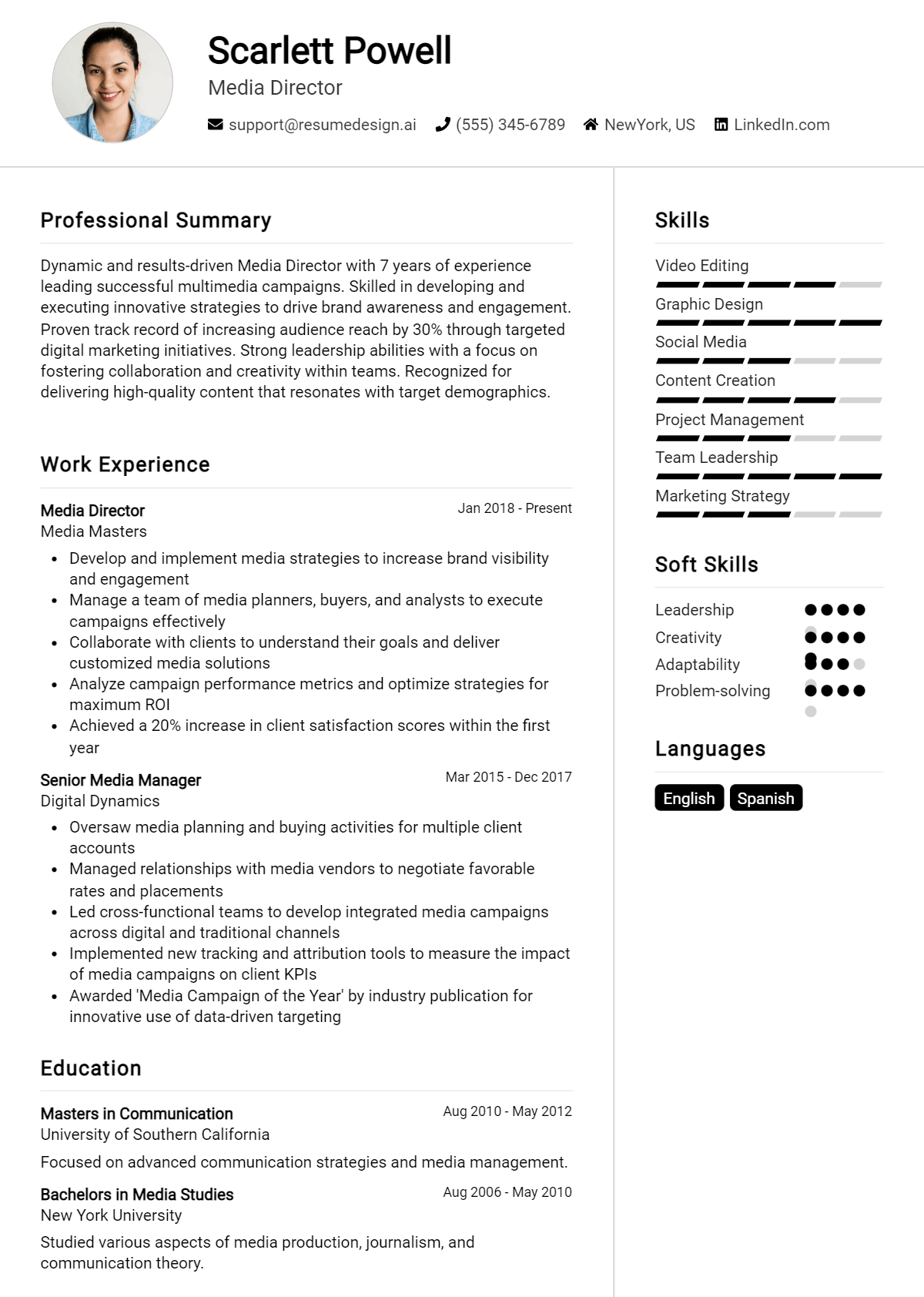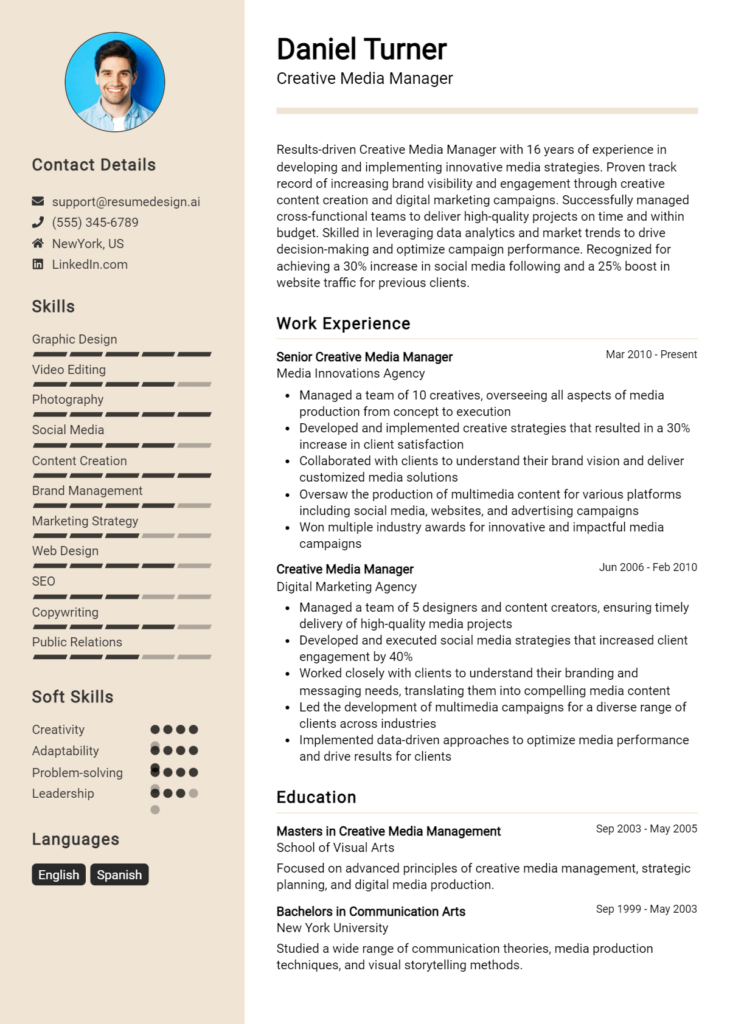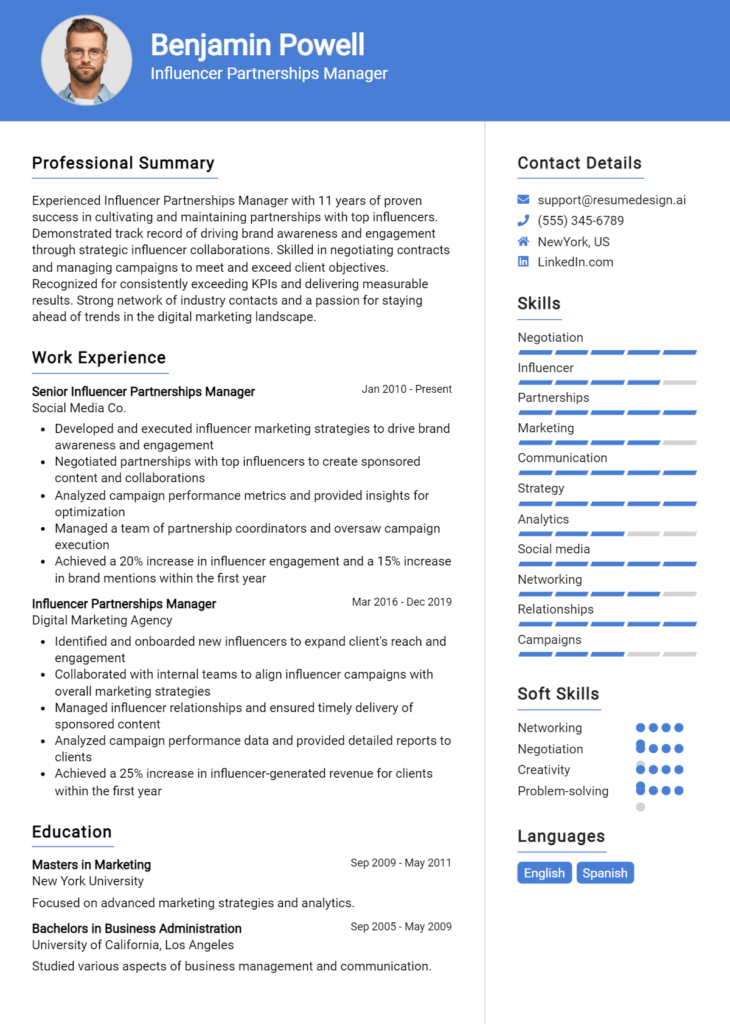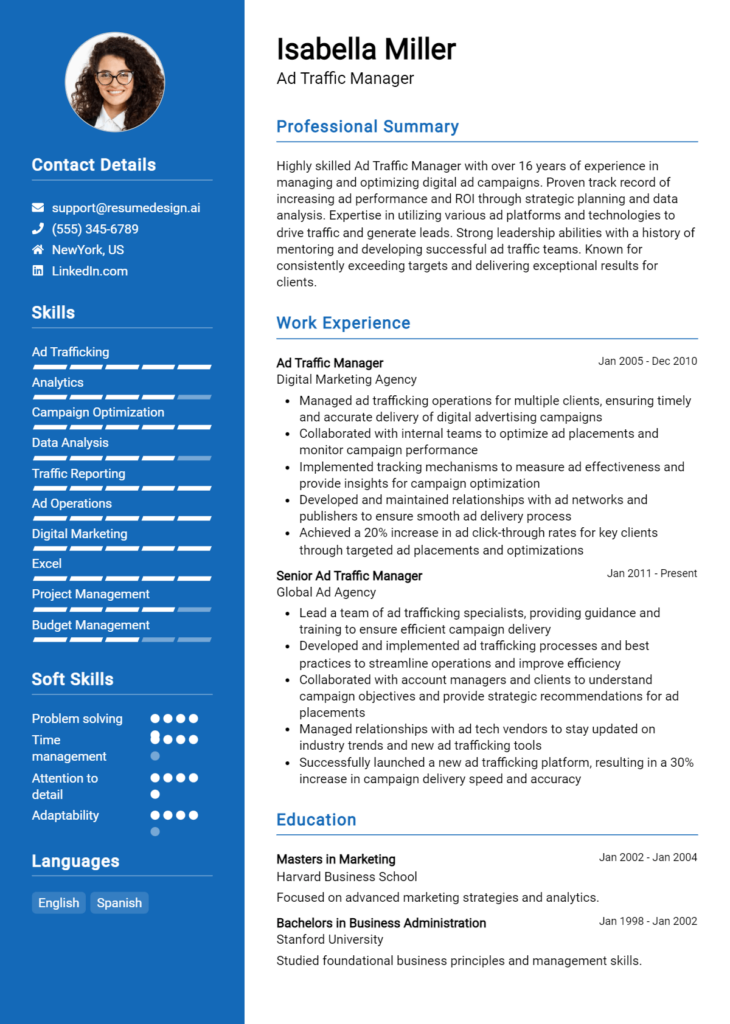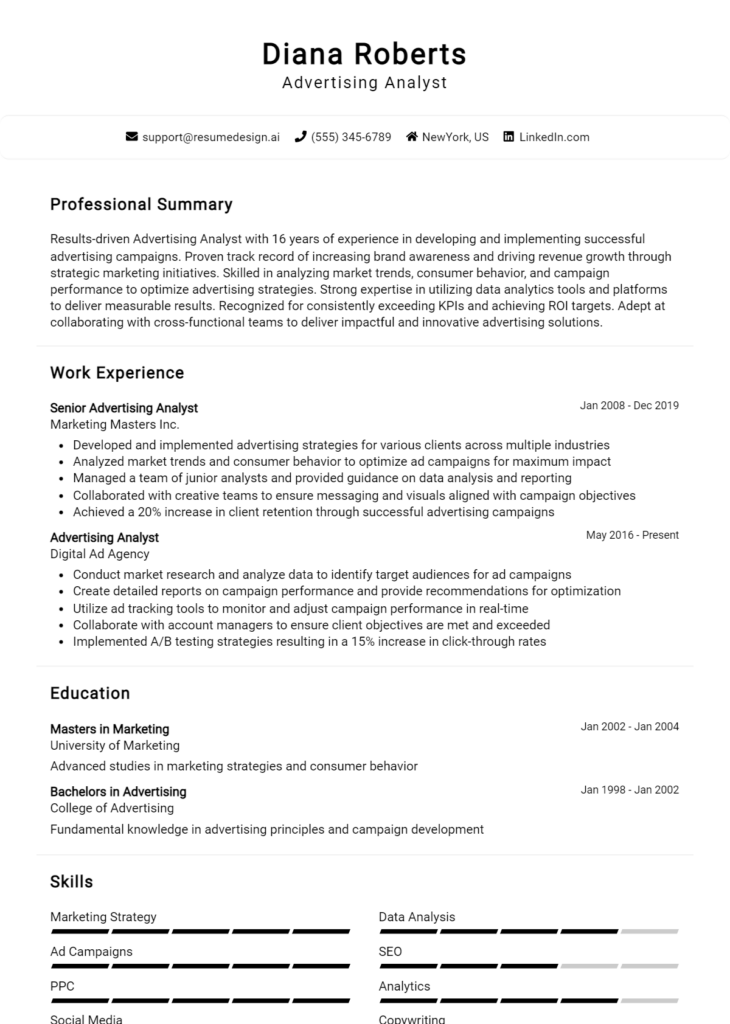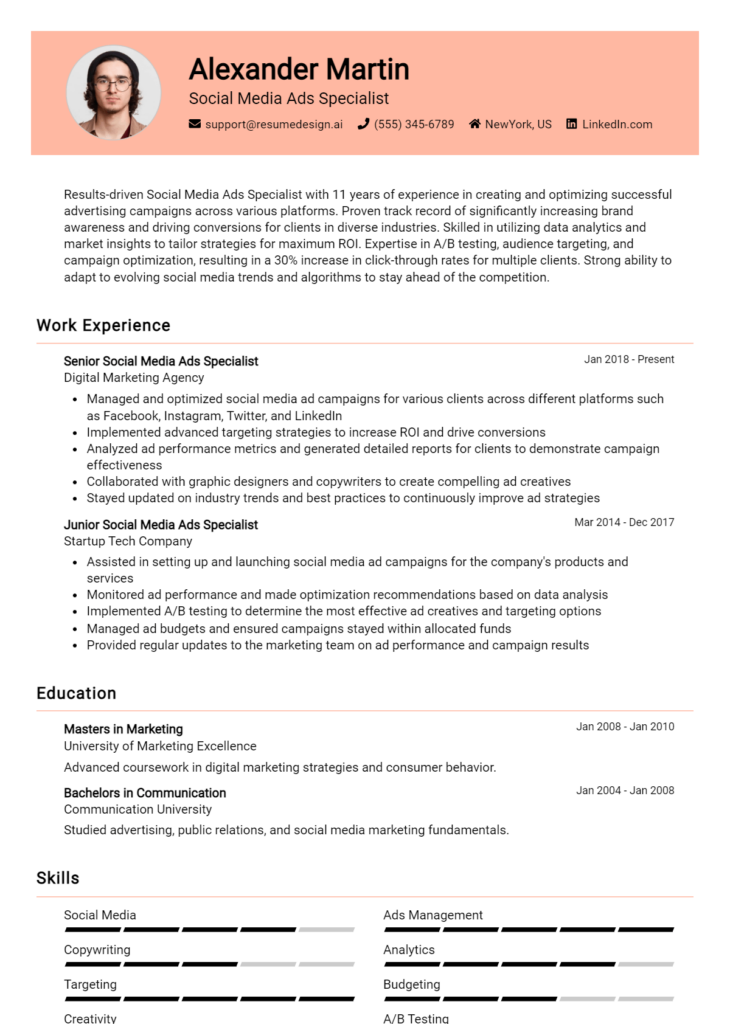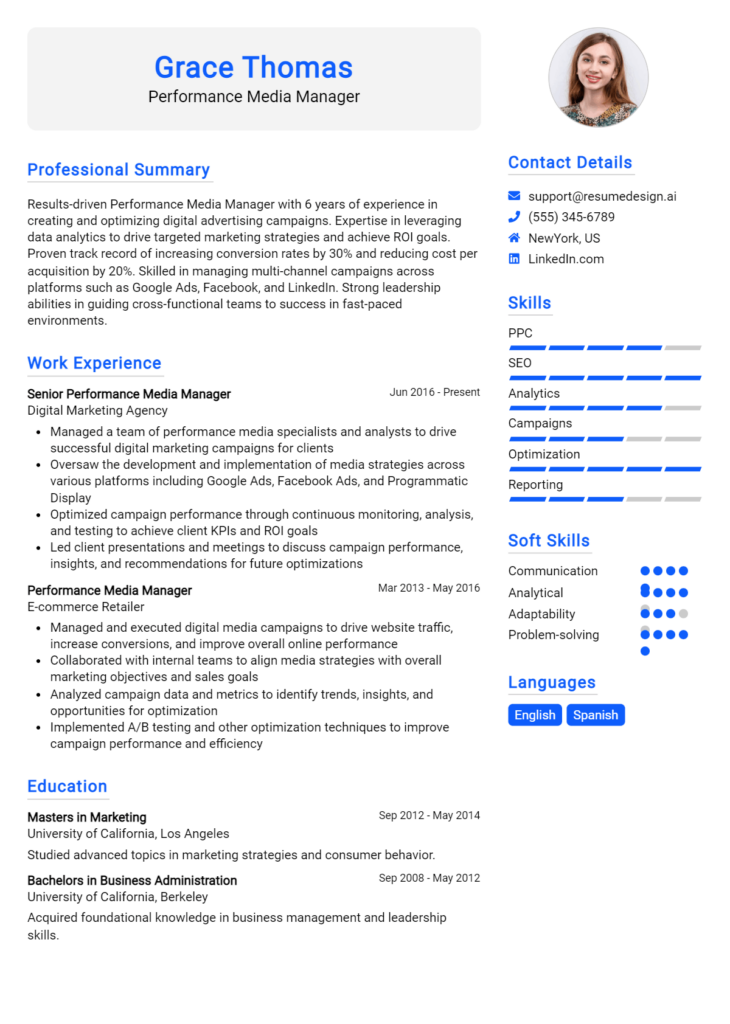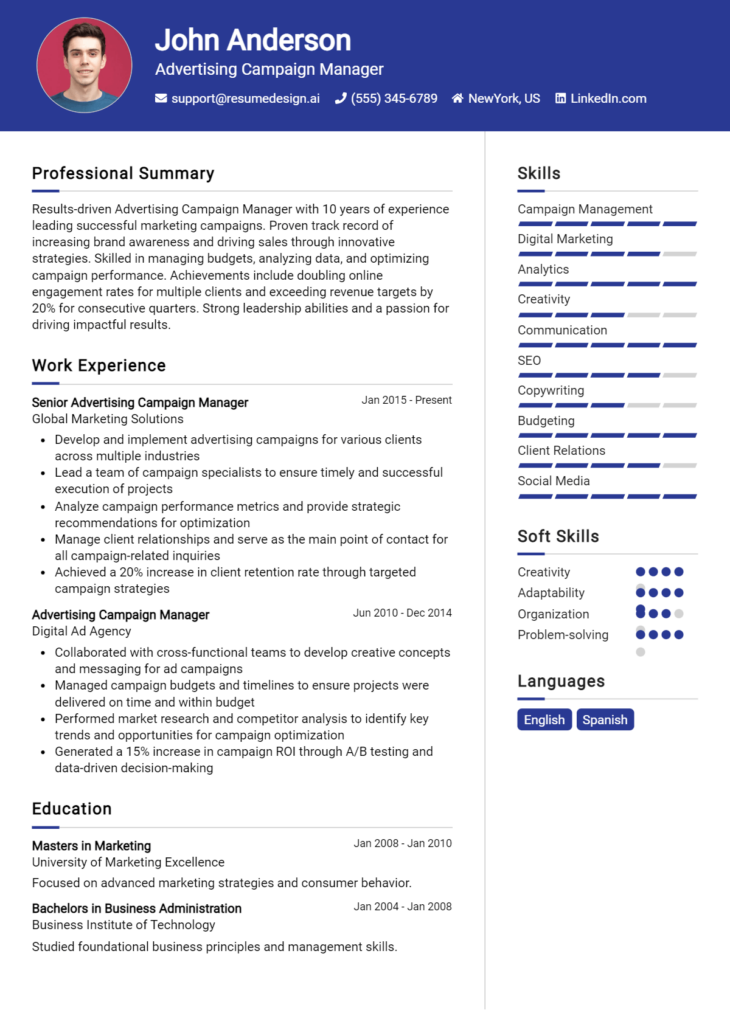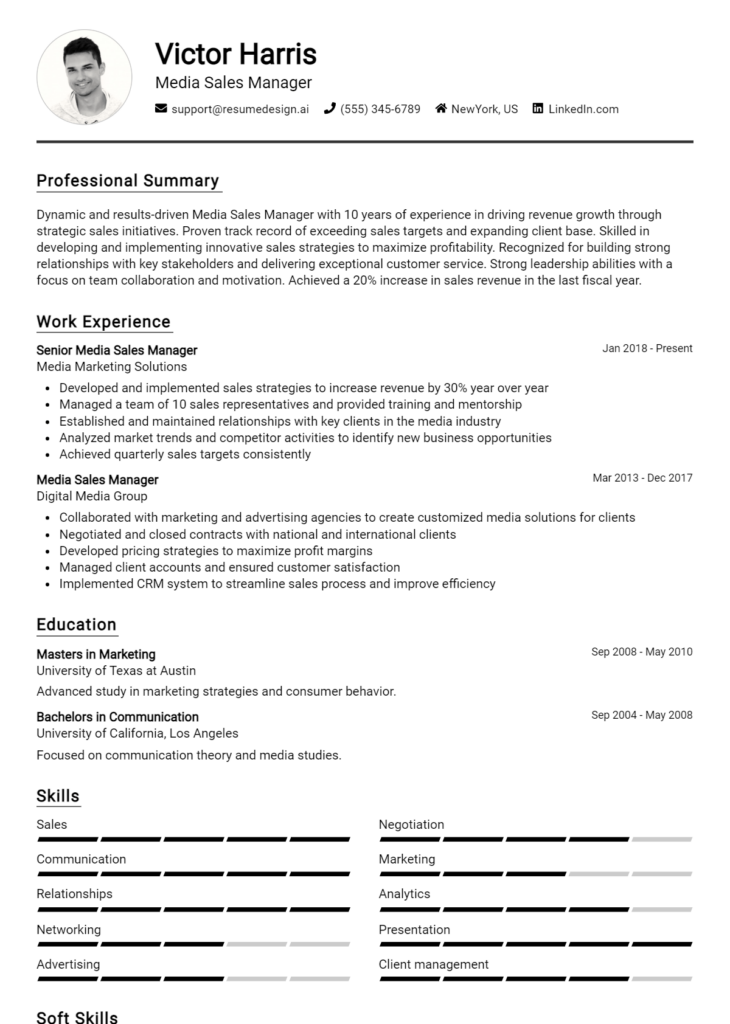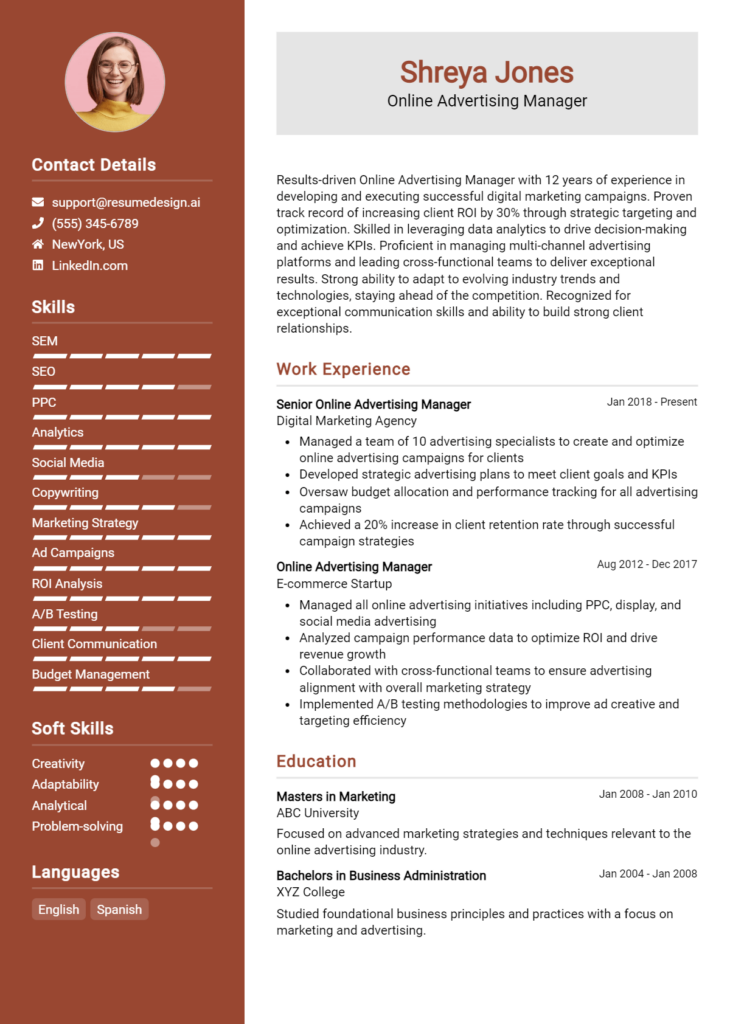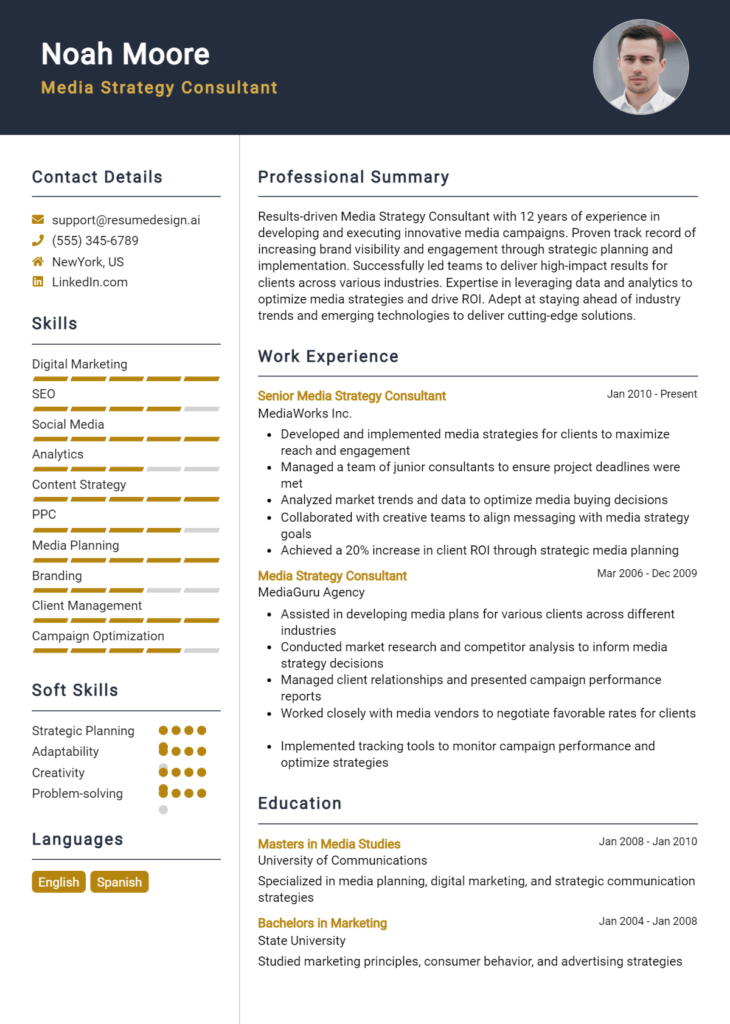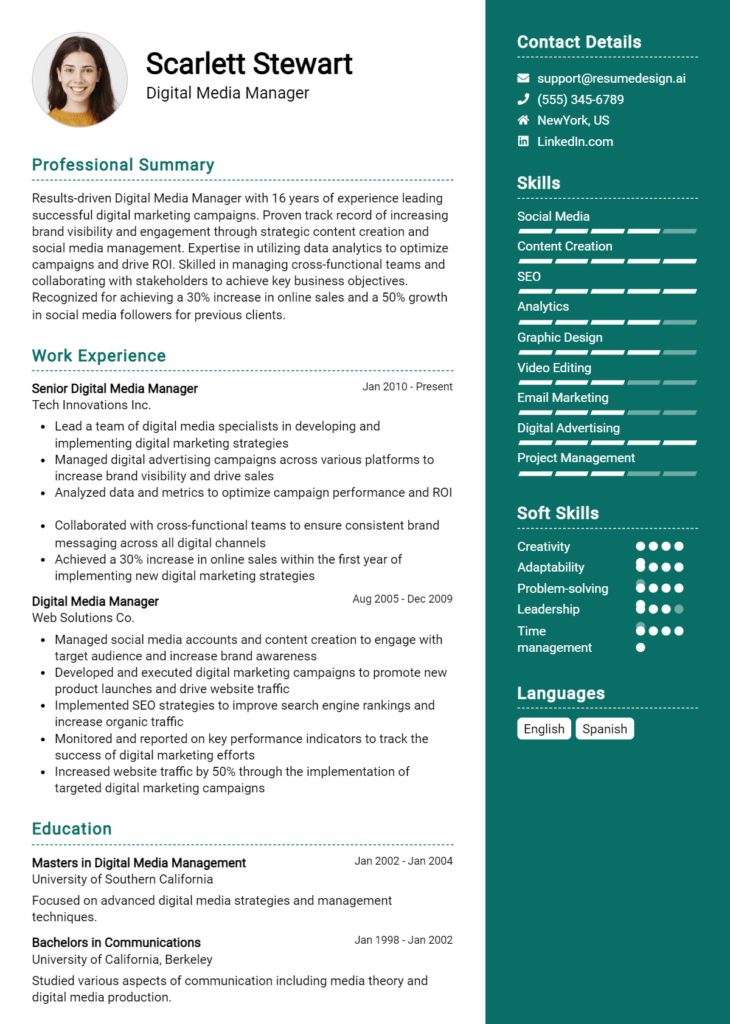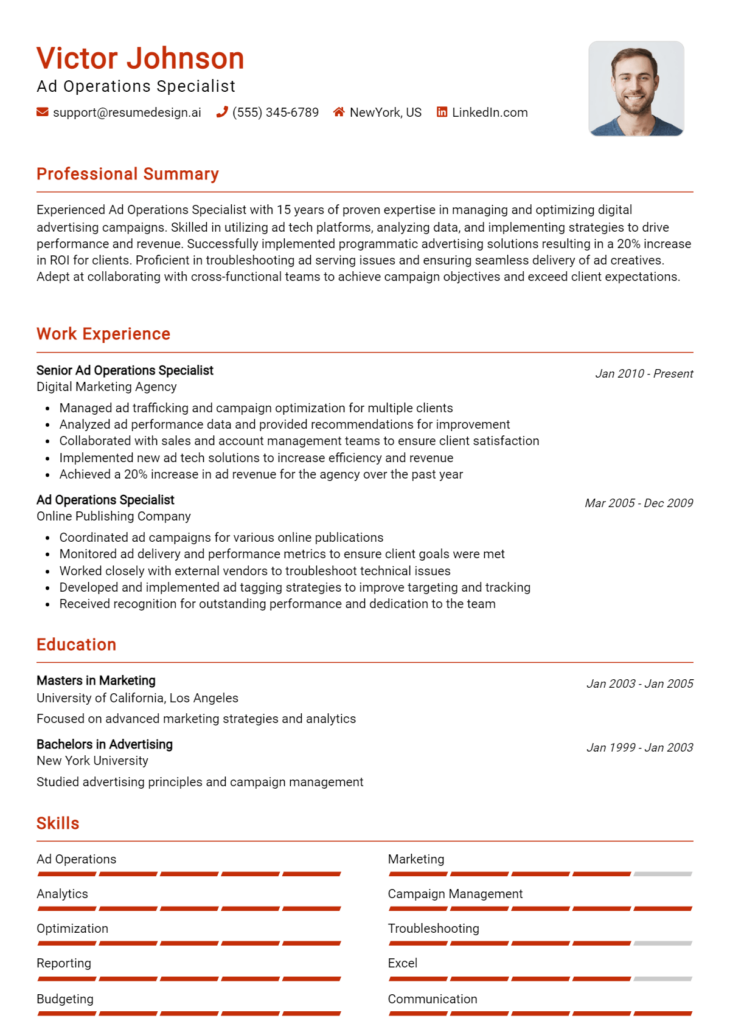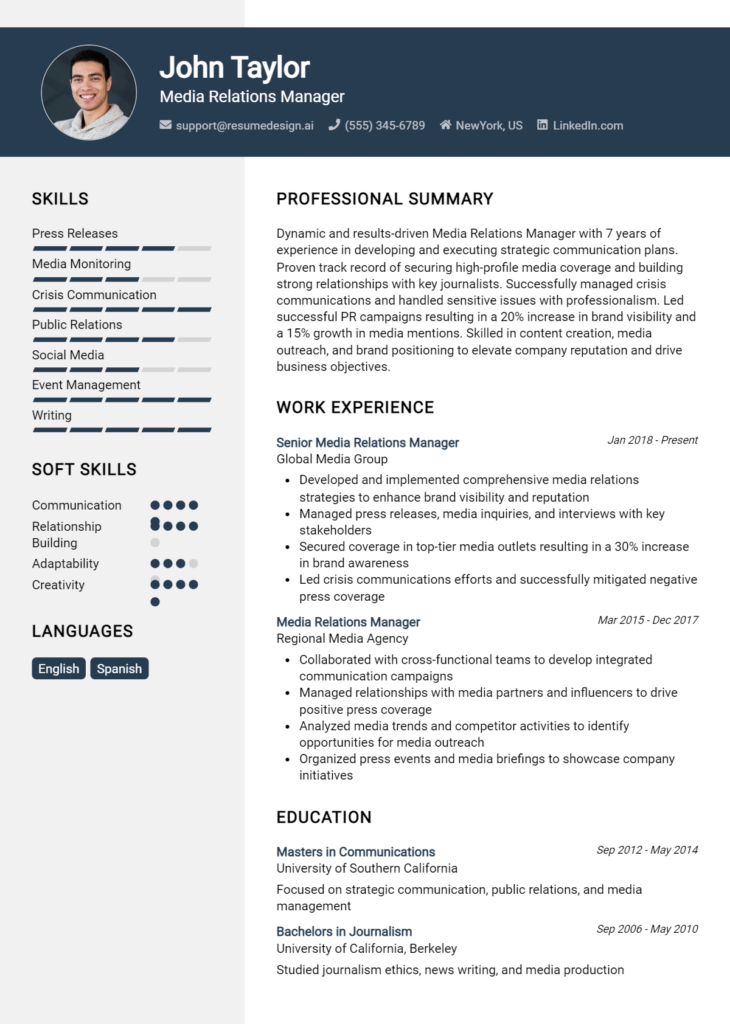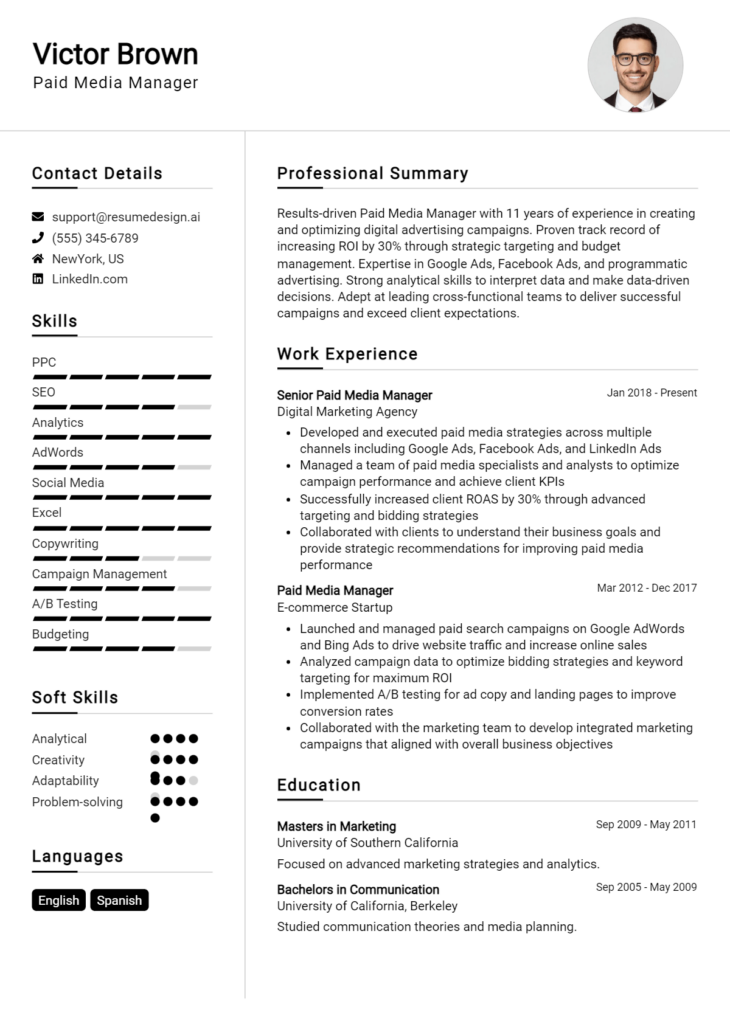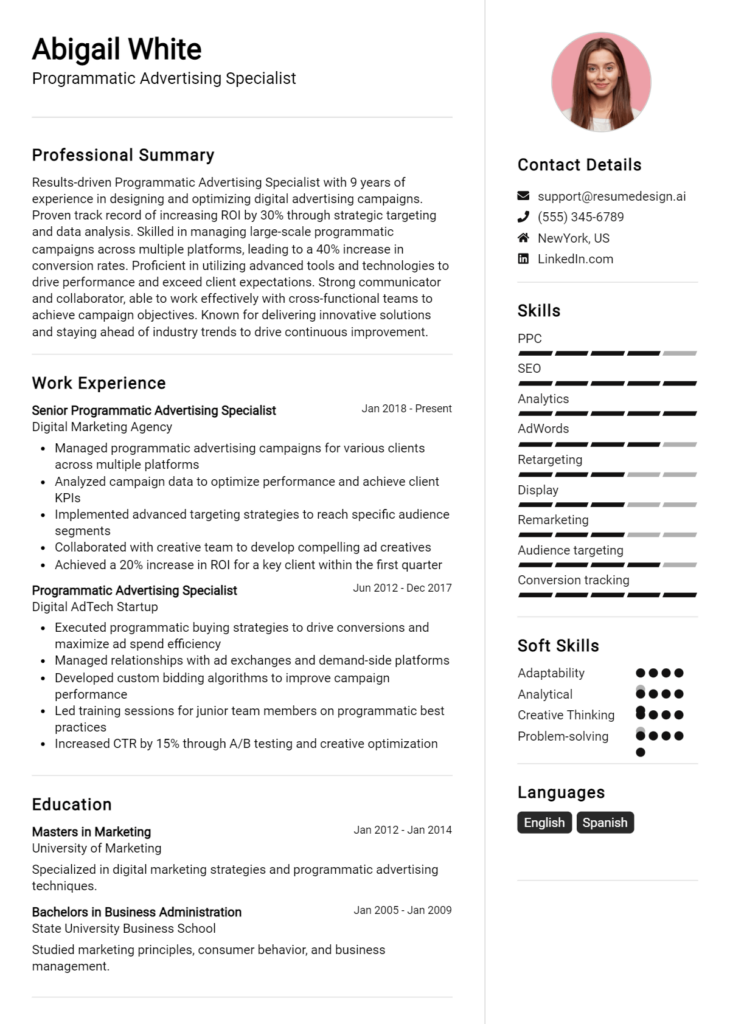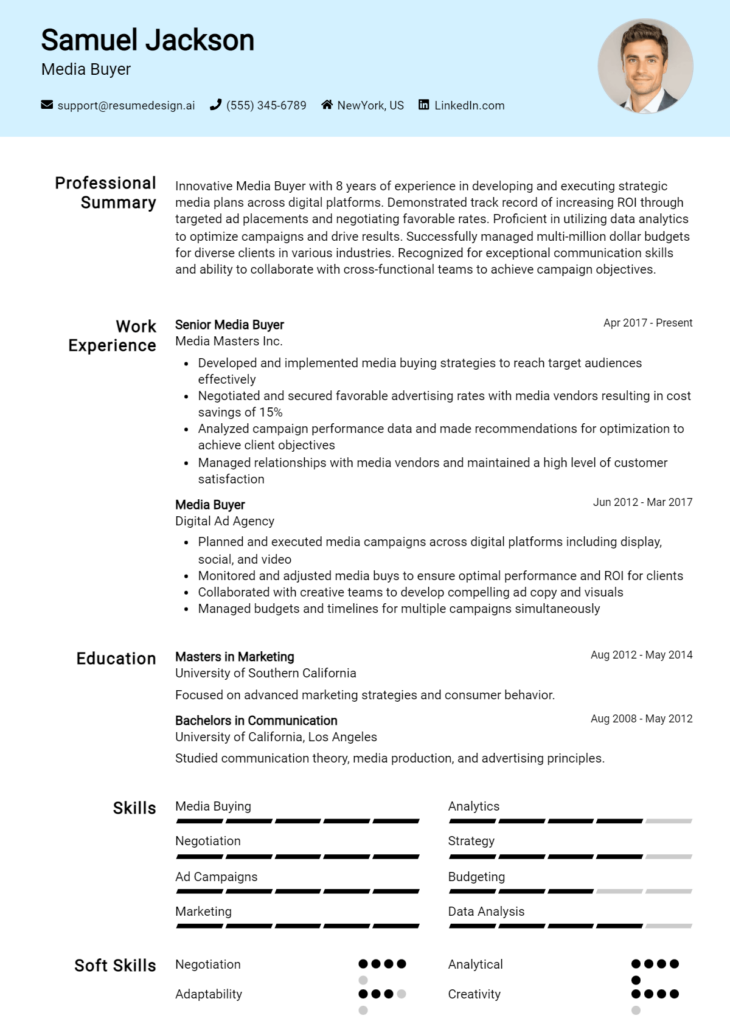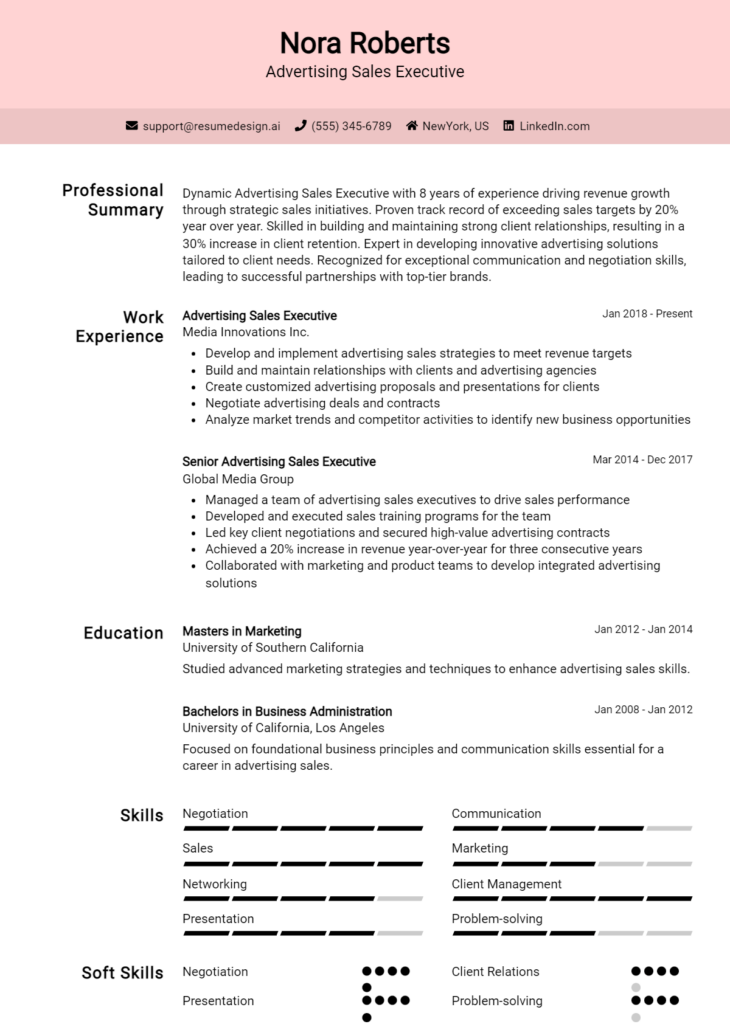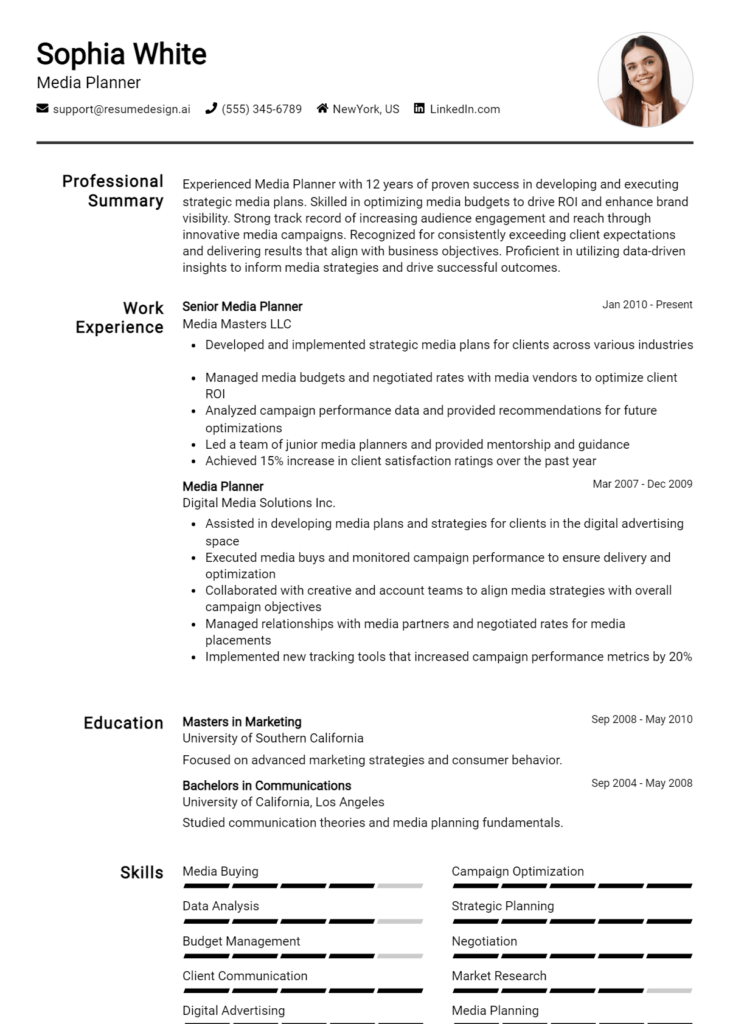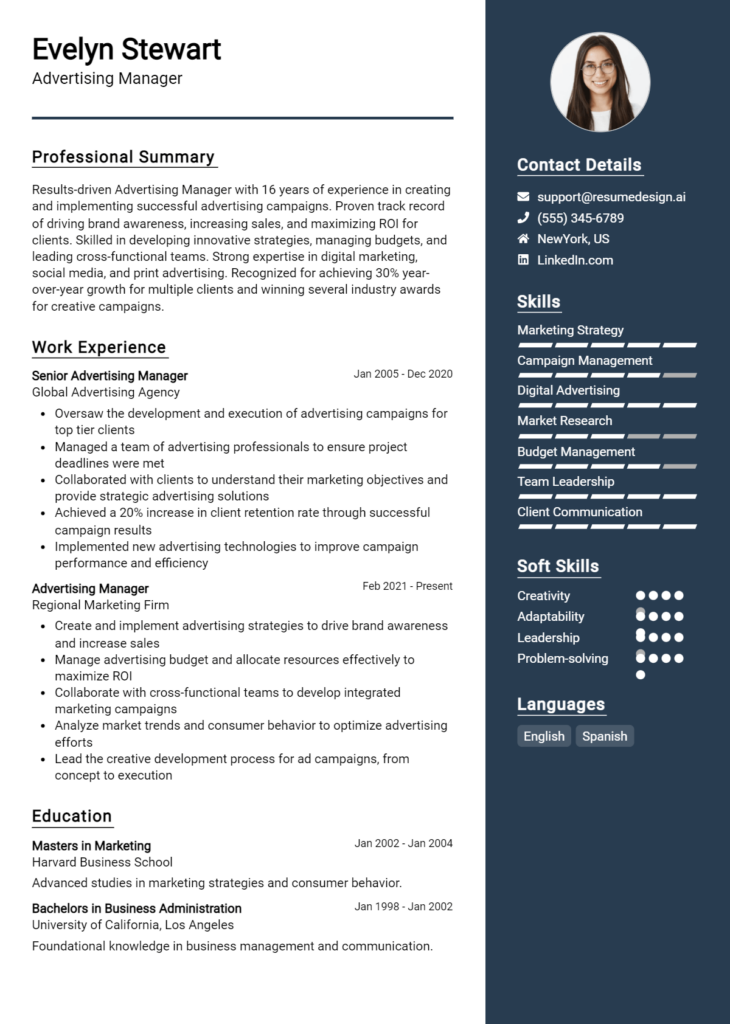Media Director Core Responsibilities
A Media Director plays a pivotal role in bridging various departments, ensuring cohesive messaging and strategy across platforms. Key responsibilities include overseeing media campaigns, managing budgets, and collaborating with marketing, creative, and sales teams. Essential skills encompass technical expertise in media analytics, operational efficiency, and strong problem-solving capabilities. These competencies are vital for aligning media strategies with organizational goals. A well-structured resume should highlight these qualifications to effectively demonstrate the candidate's value to potential employers.
Common Responsibilities Listed on Media Director Resume
- Develop and implement media strategies to boost brand visibility.
- Manage and allocate budgets for media campaigns.
- Collaborate with cross-functional teams to ensure integrated marketing efforts.
- Analyze media performance metrics and adjust strategies accordingly.
- Negotiate contracts and partnerships with media vendors.
- Oversee content creation and distribution across various channels.
- Stay updated on industry trends and emerging technologies.
- Lead and mentor a team of media professionals.
- Conduct competitive analysis to identify opportunities for growth.
- Ensure compliance with advertising regulations and standards.
- Report on campaign performance to senior management.
- Drive innovation in media tactics to enhance audience engagement.
High-Level Resume Tips for Media Director Professionals
In today’s competitive job market, a well-crafted resume is crucial for Media Director professionals looking to make a strong first impression. Your resume serves as your personal marketing tool, showcasing not just your skills and experiences, but also your ability to lead and innovate in the ever-evolving media landscape. It is often the first glimpse potential employers have of your capabilities, making it essential that it accurately reflects both your achievements and your unique qualifications. This guide will provide practical and actionable resume tips specifically tailored for Media Director professionals to help you stand out from the crowd.
Top Resume Tips for Media Director Professionals
- Tailor your resume to the specific job description, highlighting keywords and phrases that align with the role.
- Showcase relevant experience in media planning, strategy, and execution, emphasizing your leadership roles.
- Quantify your achievements by including metrics such as audience growth, campaign performance, or budget management.
- Highlight industry-specific skills, such as proficiency with media buying tools, analytics software, or content management systems.
- Include a summary statement that captures your professional identity and outlines your key strengths.
- Utilize a clean and professional layout that makes it easy for hiring managers to navigate your qualifications.
- Incorporate testimonials or brief quotes from colleagues or clients to add credibility and demonstrate your impact.
- List any relevant certifications or professional development courses that enhance your qualifications.
- Keep your resume concise, ideally one page, focusing on the most impactful and relevant information.
- Proofread carefully to ensure there are no grammatical errors or typos, as these can undermine your professionalism.
Implementing these tips can significantly increase your chances of landing a job in the Media Director field. By presenting a polished and targeted resume, you not only highlight your qualifications but also demonstrate your understanding of the industry's demands and your readiness to take on a leadership role. Stand out with a resume that effectively communicates your unique value proposition and sets the stage for a successful career in media management.
Why Resume Headlines & Titles are Important for Media Director
In the competitive field of media management, a Media Director's resume must stand out to capture the attention of hiring managers. Resume headlines and titles play a crucial role in this process, serving as the first impression a candidate makes. A strong headline or title can succinctly summarize a candidate's key qualifications and expertise in a single, impactful phrase. It should be concise, relevant, and tailored to the specific job being applied for, allowing hiring managers to quickly assess a candidate's fit for the role and encouraging them to delve deeper into the resume. An effective headline acts as a hook that draws the reader in, making it essential for candidates to invest time in crafting the perfect introduction to their professional narrative.
Best Practices for Crafting Resume Headlines for Media Director
- Keep it concise: Aim for a headline that is no more than 10-12 words.
- Be role-specific: Use terminology and keywords relevant to the Media Director position.
- Highlight key achievements: Incorporate quantifiable results or notable accomplishments.
- Showcase expertise: Include specific skills or areas of specialization.
- Use action verbs: Begin with strong action words that convey leadership and initiative.
- Tailor for each application: Customize the headline to align with the job description.
- Avoid jargon: Use clear language that is easily understood by all hiring professionals.
- Convey value: Clearly communicate what you bring to the table as a candidate.
Example Resume Headlines for Media Director
Strong Resume Headlines
Dynamic Media Director with 10+ Years of Leading High-Impact Campaigns
Award-Winning Media Strategist Specializing in Digital Transformation
Results-Driven Media Director Focused on Driving Audience Engagement
Innovative Media Leader with Proven Success in Brand Development
Weak Resume Headlines
Media Director Looking for Opportunities
Experienced Professional in Media
Seeking Media Director Position
The strong headlines are effective because they provide a clear snapshot of the candidate's qualifications, emphasizing their unique skills, achievements, and relevance to the Media Director role. They command attention and convey confidence, making a memorable impression. In contrast, the weak headlines fail to impress due to their vagueness and lack of specificity; they do not communicate the candidate's value or differentiate them from others in the field. By avoiding generic phrases and instead opting for impactful statements, candidates can significantly enhance their chances of being noticed by hiring managers.
Writing an Exceptional Media Director Resume Summary
A well-crafted resume summary is a crucial component for a Media Director, as it serves as the first impression for hiring managers. This concise section allows candidates to quickly communicate their key skills, extensive experience, and notable accomplishments relevant to media management and strategy. An impactful summary captures attention, compelling employers to delve deeper into the candidate's qualifications. It should be tailored to the specific job description and succinctly highlight what sets the candidate apart from others in the field.
Best Practices for Writing a Media Director Resume Summary
- Quantify Achievements: Use numbers and metrics to demonstrate success, such as increased viewership or revenue growth.
- Focus on Relevant Skills: Highlight specific skills that align with the job description, such as media planning, digital marketing, or team leadership.
- Tailor for the Job: Customize the summary for each position to reflect the requirements and language of the job posting.
- Be Concise: Keep the summary brief, ideally 3-5 sentences, to maintain the reader's attention.
- Showcase Industry Knowledge: Mention familiarity with current media trends or technologies relevant to the industry.
- Highlight Leadership Experience: Emphasize any roles where you led a team or managed projects to showcase your capability in a director role.
- Use Action Words: Start sentences with powerful verbs to convey confidence and proactivity.
- Reflect Professional Tone: Maintain a professional tone that aligns with the expectations of the role and company culture.
Example Media Director Resume Summaries
Strong Resume Summaries
Dynamic Media Director with over 10 years of experience in leading high-impact campaigns that have increased audience engagement by 35% year-over-year. Proficient in leveraging data analytics to drive media strategy and optimize budget allocations resulting in a 20% reduction in costs while maintaining quality.
Results-driven Media Director skilled in digital marketing and brand management, successfully launching multi-platform campaigns that generated an average ROI of 150%. Expert in team leadership, mentoring a creative team of 15 to exceed client expectations consistently.
Accomplished Media Director with a proven track record of enhancing brand visibility through innovative media strategies. Increased social media followers by 300% within one year and led a project that improved audience reach by 50%, significantly boosting revenue streams.
Weak Resume Summaries
Experienced Media Director seeking new opportunities in media management. Skilled in various aspects of media.
Media professional with a background in directing and managing teams. Looking to utilize my skills in a new role.
The strong resume summaries are effective because they provide specific achievements and quantifiable results, showcasing the candidate's relevant skills and experiences directly tied to the Media Director role. In contrast, the weak summaries lack detail and specificity, making them too vague and generic to capture the attention of hiring managers. They fail to illustrate the candidate's impact or unique qualifications, which diminishes their appeal.
Work Experience Section for Media Director Resume
The work experience section of a Media Director resume is vital as it provides a comprehensive overview of the candidate's professional journey, demonstrating not only their technical skills but also their capability to lead teams and produce high-quality media products. This section serves as a platform to showcase specific achievements, emphasizing the candidate's ability to manage complex projects, navigate challenges, and deliver results that align with industry standards. Quantifying achievements, such as increased engagement metrics or successful campaign outcomes, adds credibility and impact, making it essential for candidates to articulate their experience in a way that resonates with potential employers.
Best Practices for Media Director Work Experience
- Highlight technical skills relevant to media production, such as proficiency in software and tools.
- Quantify achievements with specific metrics, such as audience growth or revenue increase.
- Demonstrate leadership experience by detailing team management and project oversight.
- Showcase collaboration by mentioning partnerships with other departments or stakeholders.
- Use action verbs to convey responsibility and impact in previous roles.
- Align your experience with industry trends and standards to emphasize relevance.
- Include examples of problem-solving and innovation in media projects.
- Tailor your work experience to the job description to highlight the most relevant skills and achievements.
Example Work Experiences for Media Director
Strong Experiences
- Led a cross-functional team in the production of a digital marketing campaign that increased website traffic by 150% within three months, resulting in a 30% rise in sales.
- Implemented a new media strategy that enhanced audience engagement by 40%, utilizing data analytics to optimize content delivery across multiple platforms.
- Managed a $1 million budget for a national advertising campaign, achieving a return on investment (ROI) of 250% through targeted media buys and strategic partnerships.
- Developed and executed a comprehensive training program for junior media staff, resulting in a 50% decrease in project turnaround time and improved overall quality of deliverables.
Weak Experiences
- Worked on various media projects with no specific details on contributions or outcomes.
- Assisted in team meetings and provided input without outlining the impact of those contributions.
- Responsible for media planning without mentioning the scope or success of the plans executed.
- Participated in campaigns that were average in performance, lacking quantifiable achievements or metrics.
The examples of strong experiences are considered effective because they provide clear, quantifiable outcomes that demonstrate the candidate's ability to drive results and lead teams effectively. They highlight specific achievements that are relevant to the role, showcasing both technical skills and leadership qualities. In contrast, the weak experiences lack detail and measurable success, making it difficult for potential employers to assess the candidate's impact and capabilities. Vague descriptions do not convey the necessary expertise or contributions, which diminishes the overall effectiveness of the resume.
Education and Certifications Section for Media Director Resume
The education and certifications section of a Media Director resume is crucial for showcasing the candidate's academic background, industry-relevant credentials, and commitment to continuous learning. This section not only illustrates the formal training a candidate has received but also highlights specialized skills and knowledge that align with the responsibilities of a Media Director. By providing relevant coursework, certifications, and any specialized training, candidates can significantly enhance their credibility and demonstrate their preparedness for the role, making them more appealing to potential employers.
Best Practices for Media Director Education and Certifications
- Include degrees from accredited institutions relevant to media, communications, or marketing.
- Highlight industry-recognized certifications, such as Google Ads, Facebook Blueprint, or HubSpot certifications.
- Focus on coursework that directly relates to media strategy, digital marketing, and content creation.
- List any specialized training or workshops that enhance skills pertinent to media direction.
- Keep the section concise but detailed, ensuring each entry is relevant and adds value.
- Use bullet points for clarity and easy readability, making it simple for hiring managers to scan for important information.
- Consider including ongoing education efforts, such as online courses or professional development seminars.
- Prioritize recent qualifications over older ones to reflect current knowledge and skills.
Example Education and Certifications for Media Director
Strong Examples
- M.A. in Media Studies, University of California, Los Angeles (UCLA)
- Certified Digital Marketing Professional (CDMP), Digital Marketing Institute
- Advanced Social Media Strategy Certification, HubSpot Academy
- Relevant Coursework: Multimedia Production, Strategic Communication, Digital Content Strategy
Weak Examples
- B.A. in History, State University (not relevant to media)
- Certification in Basic Photography (outdated and not relevant)
- Online Course in General Business Management (too broad and not industry-specific)
- High School Diploma (not sufficient for a senior role like Media Director)
The examples listed as strong illustrate relevant degrees and certifications that directly align with the skills and knowledge required for a Media Director role, showcasing specialized training that enhances the candidate's qualifications. In contrast, the weak examples highlight educational backgrounds and certifications that either lack relevance or fail to demonstrate a level of expertise expected in the media industry, which may raise concerns about the candidate's preparedness for the role.
Top Skills & Keywords for Media Director Resume
As a Media Director, possessing the right skills is crucial for excelling in a highly competitive and ever-evolving industry. A well-crafted resume that highlights both hard and soft skills not only showcases your qualifications but also demonstrates your ability to lead teams and manage complex media projects. The combination of creativity, technical know-how, and interpersonal skills is essential for driving successful media campaigns and achieving organizational goals. Potential employers are keen on identifying candidates who can navigate the dynamic landscape of media, making it imperative to emphasize these skills effectively in your resume.
Top Hard & Soft Skills for Media Director
Soft Skills
- Leadership
- Communication
- Team collaboration
- Creative thinking
- Problem-solving
- Time management
- Adaptability
- Strategic planning
- Negotiation
- Conflict resolution
- Emotional intelligence
- Networking
- Client relationship management
- Critical thinking
- Decision-making
Hard Skills
- Media planning and buying
- Digital marketing strategies
- Social media management
- Content creation and curation
- Data analysis and reporting
- Budget management
- SEO and SEM proficiency
- Video production and editing
- Graphic design software (e.g., Adobe Creative Suite)
- Audience targeting and segmentation
- Project management tools (e.g., Trello, Asana)
- Market research techniques
- Brand management
- Crisis management
- Familiarity with analytics tools (e.g., Google Analytics)
For more insights on how to effectively highlight your skills and work experience, consider exploring additional resources that can guide you in crafting a compelling resume tailored to your career aspirations.
Stand Out with a Winning Media Director Cover Letter
I am writing to express my interest in the Media Director position at [Company Name] as advertised. With over [X years] of experience in media strategy, content creation, and cross-platform marketing, I am confident in my ability to lead your media team in developing innovative campaigns that drive engagement and elevate brand presence. My strong background in digital media, coupled with my passion for storytelling, allows me to create compelling narratives that resonate with diverse audiences.
In my previous role at [Previous Company Name], I successfully spearheaded a campaign that resulted in a [specific achievement, e.g., 30% increase in audience engagement or a significant rise in brand visibility]. By leveraging analytics and market research, I was able to tailor our messaging and media placements to target specific demographics effectively. My collaborative approach fostered a team environment where creativity thrived, resulting in award-winning campaigns that not only met but exceeded client expectations.
I am particularly drawn to the opportunity at [Company Name] because of your commitment to [specific aspect of the company's mission or values]. I believe that my strategic vision and hands-on experience in integrated media planning align well with your goals. I am excited about the possibility of guiding your media initiatives and contributing to projects that not only enhance your brand but also make a positive impact on the community.
Thank you for considering my application. I look forward to the opportunity to discuss how my skills and experiences align with the vision of [Company Name]. I am eager to bring my expertise in media direction to your team and help drive your company’s success in an ever-evolving media landscape.
Common Mistakes to Avoid in a Media Director Resume
When crafting a resume for a Media Director position, it's crucial to present a polished and professional image that reflects your expertise and leadership in the media industry. Many candidates make common mistakes that can undermine their chances of landing an interview. By avoiding these pitfalls, you can ensure your resume effectively showcases your skills, experience, and accomplishments in a way that resonates with hiring managers. Here are some common mistakes to watch out for:
Using a Generic Template: Relying on a one-size-fits-all resume template can make your application blend in with others. Tailor your resume to reflect your unique skills and experiences relevant to the Media Director role.
Neglecting Quantifiable Achievements: Failing to include specific metrics or achievements can weaken your impact. Use numbers to demonstrate your success, such as audience growth, budget management, or campaign performance.
Overloading with Jargon: While industry terminology is important, excessive jargon can alienate readers. Focus on clear language that conveys your expertise without overwhelming the reader.
Ignoring Relevant Experience: Some candidates overlook including relevant non-media experience. Highlight transferable skills from previous roles that showcase your leadership, project management, or strategic planning abilities.
Using an Unprofessional Email Address: An unprofessional email address can create a negative impression. Use a simple, professional email that includes your name to maintain a formal tone.
Writing a Long Summary: A lengthy resume summary can lose the reader's attention. Keep it concise—two to three sentences that summarize your core competencies and achievements.
Listing Responsibilities Instead of Accomplishments: Merely stating job duties without emphasizing what you accomplished in those roles diminishes the impact of your experience. Focus on results and contributions that demonstrate your effectiveness as a leader.
Failing to Proofread: Typos and grammatical errors can create the impression of carelessness. Always proofread your resume multiple times or have someone else review it to catch any mistakes before submission.
By being mindful of these common mistakes, you can create a compelling resume that effectively highlights your qualifications as a Media Director, making you a standout candidate in a competitive job market.
Conclusion
As a Media Director, your role is pivotal in shaping the communication strategies of your organization. You are responsible for overseeing media campaigns, managing teams, and ensuring that all messaging aligns with the brand's goals. Your expertise in media planning, content creation, and analytics is essential for driving engagement and achieving results.
In summary, the key points discussed in this article highlight the importance of a well-structured resume that reflects your unique skills and experiences. It’s crucial to emphasize your leadership abilities, strategic thinking, and proficiency in various media platforms. Furthermore, showcasing measurable outcomes from past campaigns can set you apart from other candidates.
Now is the perfect time to take action! Review your Media Director resume and ensure it effectively communicates your qualifications. To help you create a standout resume, consider utilizing available resources such as resume templates, a user-friendly resume builder, insightful resume examples, and professionally crafted cover letter templates. These tools can guide you in crafting a compelling resume that captures the attention of hiring managers. Don't wait—elevate your career today!

